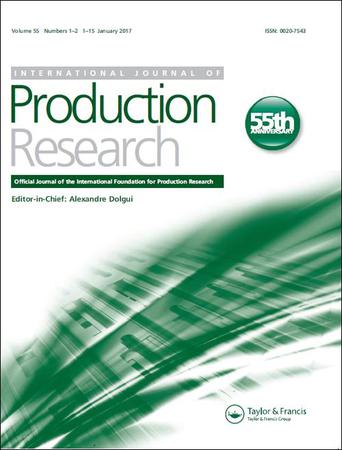在线订单批处理问题的时间窗策略
IF 7
2区 工程技术
Q1 ENGINEERING, INDUSTRIAL
International Journal of Production Research
Pub Date : 2023-10-03
DOI:10.1080/00207543.2023.2263884
引用次数: 0
摘要
当订单到达仓库时,通常会将其分配给一个批次,并决定在将该批次分配给拾取器并开始拾取之前需要等待多长时间。如果拣货机的空闲时间最小,则立即分配批次,并开始拣货。或者,如果引入时间窗口,其他订单可能会到达,并且可能形成更有效的批次。因此,决定等待多长时间的方法(时间窗口策略)很重要,但令人惊讶的是,在文献中几乎完全被忽视了。在本文中,我们证明了这种缺乏关注是没有根据的,并且时间窗口方法显着影响整体仓库性能。在在线订单批处理问题(OOBP)的背景下,我们首先证明了不同时间窗口策略的影响与用于解决OOBP的其他子问题(批处理和路由)的方法无关。其次,我们提出了两种新的时间窗策略,并将它们与现有方法进行了比较,证明我们的方法在各种场景下都优于文献中的方法。最后,我们展示了时间窗方法在不同订单和选择者数量时如何影响OOBP的不同目标函数。关键词:在线订单批量问题时间窗口固定时间窗口可变时间窗口拣货仓储披露声明作者未报告潜在的利益冲突。数据可用性声明作者确认,支持本研究结果的数据可应要求免费获取,并在本文的附录中提供。其他信息关于贡献者的说明sergio Gil-BorrásSergio Gil-Borrás于2022年获得马德里politcima大学计算机科学博士学位。此外,他获得了同一所大学的计算机工程学位,并完成了马德里大学卡洛斯三世的网络安全硕士学位。他目前在马德里politcnica大学担任教授,并与一个研究小组合作研究仓库流程优化,特别是订单批处理问题等问题。Eduardo G. Pardo于2011年获得西班牙雷胡安卡洛斯大学计算机科学博士学位。他的研究重点是利用人工智能技术解决复杂的优化问题。其中,他是开发启发式和元启发式算法的专家。目前,他是西班牙雷胡安卡洛斯大学计算机科学学院的教授。Ernesto jimsamnez于2004年毕业于马德里理工大学(西班牙)计算机科学专业,并获得西班牙雷伊胡安卡洛斯大学(西班牙)计算机科学博士学位。主要研究方向为分布式系统容错、计算机网络、并行与分布式处理。他目前是马德里politcnica大学副教授。Kenneth SörensenKenneth Sörensen于2003年在比利时安特卫普大学获得博士学位。他擅长使用人工智能来解决复杂的优化挑战。他的专长主要在于制作启发式和元启发式算法。目前,他是安特卫普大学的正教授。本文章由计算机程序翻译,如有差异,请以英文原文为准。
The time-window strategy in the online order batching problem
AbstractWhen an order arrives at a warehouse it is usually assigned to a batch and a decision is made on how long to wait before assigning the batch to a picker and starting the picking tour. If the idle time of the pickers is minimised, the batch is immediately assigned, and the picking starts. Alternatively, if a time window is introduced, other orders may arrive, and more efficient batches may be formed. The method to decide how long to wait (the time-window strategy) is therefore important but, surprisingly, almost completely overlooked in the literature. In this paper, we demonstrate that this lack of attention is unwarranted, and that the time-window method significantly influences the overall warehouse performance. In the context of the online order batching problem (OOBP), we first demonstrate that the effects of different time-window strategies are independent of the methods used to solve the other subproblems of the OOBP (batching and routing). Second, we propose two new time-window strategies, compare them to existing methods, and prove that our methods outperform those in the literature under various scenarios. Finally, we show how time-window methods influence different objective functions of the OOBP when varying numbers of orders and pickers.Keywords: Online order batching problemtime windowfixed time windowvariable time windoworder pickingwarehousing Disclosure statementNo potential conflict of interest was reported by the author(s).Data availability statementThe authors confirm that the data supporting the findings of this study is freely available upon request and in the Appendix of this paper.Additional informationNotes on contributorsSergio Gil-BorrásSergio Gil-Borrás obtained his Ph.D. in Computer Science from Universidad Politécnica de Madrid in 2022. Additionally, he received his degree in Computer Engineering from the same university and completed a Master's degree in Cybersecurity from Universidad Carlos III de Madrid. He is currently working as a professor at Universidad Politécnica de Madrid and also collaborating with a research group on warehouse process optimisation, particularly the order batching problems, among other issues.Eduardo G. PardoEduardo G. Pardo received his Ph.D. in Computer Science from Universidad Rey Juan Carlos (Spain) in 2011. His research is focused on solving complex optimisation problems using Artificial Intelligence techniques. Among others, he is expert in the development of heuristic and metaheuristic algorithms. Currently, he is professor at the Computer Science School at Universidad Rey Juan Carlos (Spain).Ernesto JiménezErnesto Jiménez graduated in Computer Science from the Universidad Politécnica de Madrid (Spain) and got a Ph.D. in Computer Science from the University Rey Juan Carlos (Spain) in 2004. His research interests include Fault Tolerance in Distributed Systems, Computer Networks and Parallel and Distributed Processing. He is currently an associate professor at the Universidad Politécnica de Madrid.Kenneth SörensenKenneth Sörensen earned his Ph.D. from the University of Antwerp, Belgium, in 2003. He specialises in using Artificial Intelligence to tackle intricate optimisation challenges. His expertise notably lies in crafting heuristic and metaheuristic algorithms. At present, he is a full professor at the University of Antwerp.
求助全文
通过发布文献求助,成功后即可免费获取论文全文。
去求助
来源期刊

International Journal of Production Research
管理科学-工程:工业
CiteScore
19.20
自引率
14.10%
发文量
318
审稿时长
6.3 months
期刊介绍:
The International Journal of Production Research (IJPR), published since 1961, is a well-established, highly successful and leading journal reporting manufacturing, production and operations management research.
IJPR is published 24 times a year and includes papers on innovation management, design of products, manufacturing processes, production and logistics systems. Production economics, the essential behaviour of production resources and systems as well as the complex decision problems that arise in design, management and control of production and logistics systems are considered.
IJPR is a journal for researchers and professors in mechanical engineering, industrial and systems engineering, operations research and management science, and business. It is also an informative reference for industrial managers looking to improve the efficiency and effectiveness of their production systems.
 求助内容:
求助内容: 应助结果提醒方式:
应助结果提醒方式:


